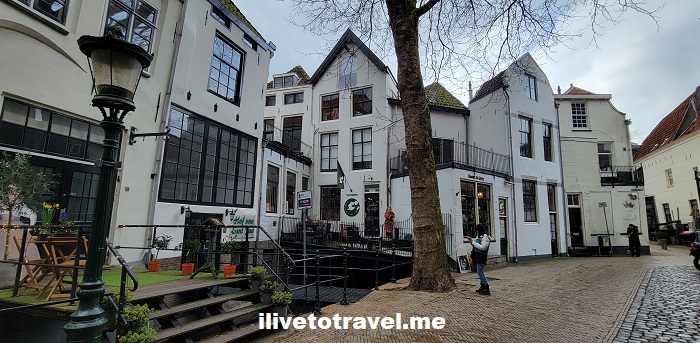As my trip to The Netherlands was taking shape, I was looking forward to visiting the town eponymous with cheese: Gouda. I had never stop to contemplate what this cheese town in The Netherlands could actually be like, much less look it up.
Gouda’s name doesn’t sound like it reads
Once in The Netherlands, I learned the town name is pronounced something like “Hao-da”. It does sound ridiculous vs. the pronunciation of the letters in English (or Spanish, or many other languages). But that is the cool thing about Dutch: it is very much its OWN thing. I tried not to be pretentious since it was only a half-day visit. So I stuck to “Goo-da” but I avoided saying it in front of locals to not offend 🙂

Getting to Gouda
My visit to Gouda would be a daytrip from Rotterdam. Staying in Rotterdam, made it very easy to squeeze in a side trip since the ride was so short – about 20+ mins. From the Gouda train station, it was a 5-min walk to the shopping/pedestrian street leading to the heart of town. Easy-peasy!

Tourist in Gouda
We stopped at the tourist info office at the heart of town (the “VVV“) and oriented ourselves. It is a small office and a good place to get info, plans, etc. if you have not done much research beforehand. They sell a handy and compact visitor booklet for 5 euros that is worth the spend. It orients you to town and the places to be sure to notice/see intown.
The tourist office is within a historic building, De Waag, where they weighed cheese brought in to the market for sale. Considering Gouda’s cheese market was established in 1198, we can say a lot of cheese has gone through it. Now, the Waag hosts the VVV and a small museum.


Cheese Town
We learned that Gouda became the “it” place for the cheese commerce beating other competitor towns. I thought the cheese was named for the town because it was made there but, no, it was made in the region. Gouda was just like the trading center. Who knew?
The central square still hosts a cheese market one day a week. The Gothic building at the center, City Hall or Stadhuis, built around 1450, was placed alone to avoid it catching fire should a fire start around it.



Cheese Tasting
We opted to do a cheese exploration by visiting the Gouda Cheese Experience. It was a neat place with some hands-on interaction (not making cheese but in other ways) which made it interesting for kids and adults.

At the end, we had the chance to taste some cheeses before heading out. It was a good way to learn more about cheesemaking in all its aspects (ingredients, process, packaging, etc.).

Amazing stained windows at Sint-Janskerk
Taking a small side alley from the market square, one enters the quaint area around the church of St John’s (Sint-Janskerk). The area is small and kept much as it has been for ages. It became one of my favorite spots in The Netherlands!







The church is protestantly sparse – devoid of the warmth that I am used to in a place of worship. However, it hosts 72 amazing 16th century stained windows (most of them, not all). These stained windows were taken down during WW II so they would not be destroyed. They were stored all over the place until the war ended and they could safely hang in their usual spots.
Using an audioguide is highly recommended (included in the entrance fee) to better appreciate the art and what it depicts. It was time well spent!




The church was built in the mid-sixteenth century after fire destroyed the medieval church that was located there (not an uncommon fate for churches in those times). Another claim to fame is that it is the longest church in The Netherlands.
I hope this gives you a small glimpse into this curious Dutch town – and that perhaps you read this and it makes you want to eat some Gouda cheese!

Leave a Reply